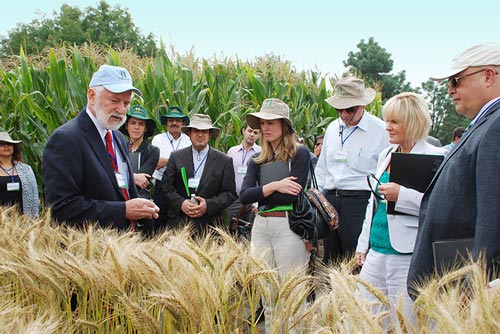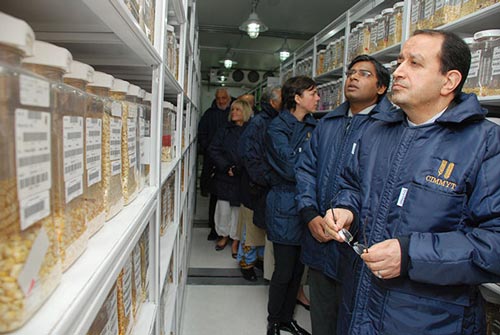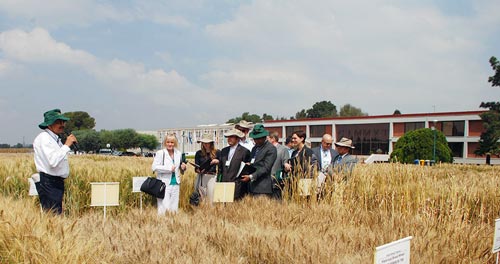
Mexico is pleased with the role of CIMMYT in national agricultural development and with the synergies that have arisen through the initiative MasAgro – the Sustainable Modernization of Traditional Agriculture, said Belisario Domínguez Méndez, Director General for Productivity and Technological Development of Mexico’s Secretariat of Agriculture, Livestock, Rural Development, Fisheries and Food (SAGARPA). “The government feels very proud that MasAgro is not only part of Mexico but is now sharing results with other countries,” said Domínguez, opening the 2013 Ambassadors Day event in El Batán, Mexico, on 10 October, on behalf of Mexican Secretary of Agriculture Enrique Martínez y Martínez. “The partnership with CIMMYT is a fundamental strategy for our country.”
Launched in 2010 and coordinated by SAGARPA and CIMMYT, MasAgro is helping strengthen national food security through research, capacity building and the transfer of technology for rural areas. Partners develop and promote the adoption of cuttingedge knowledge and practices among small- and intermediate-scale farmers of maize, wheat and small grains, to improve their incomes and mitigate the effects of climate change in Mexico. Ambassadors Day participants included members of the diplomatic corps in Mexico of 20 nations – including countries where CIMMYT works – as well as representatives of the United Nations Educational, Scientific and Cultural Organization (UNESCO), the Inter-American Institute for Cooperation in Agriculture (IICA), SAGARPA, the Technical and Scientific Cooperation Division of Mexico’s Foreign Affairs Secretariat (Secretaria de Relaciones Exteriores, or SRE) and CIMMYT staff.

The day’s program featured discussions, lab and field tours and expert briefings on CIMMYT activities and outputs, such as maize and wheat genetic resources, wheat disease resistance breeding and bread wheat quality and maize breeding and biofortification. CIMMYT staff from the home countries of the visiting dignitaries were on hand to answer questions and offer hospitality. At a gala luncheon, the debut presentation of a new general video on CIMMYT aired to many favorable comments. In his address to the visitors, CIMMYT Director General Thomas A. Lumpkin emphasized that an expanding population, changing diets, limited natural resources, demand for bio-fuels and increasingly variable climates are all putting extraordinary pressure on the global food system. “In summary, we will have huge demand for food crops coupled with worsening conditions for crop production,” Lumpkin said. “This highlights the need for improved technology.” The Ambassador of Palestine, Munjed M.S. Saleh, was impressed by CIMMYT´s presentation and said his country is already giving several countries technical support to improve water-use efficiency. He indicated that he is arranging a visit for his Minister to Mexico, and, if confirmed, will include a visit to CIMMYT.

The representative of the Embassy of Venezuela, Alba Mendez, expressed interest in working with the country’s ambassador to propose collaborating with CIMMYT to strengthen agricultural research in Venezuela. She also said she is interested in a training program for farmers. Other ambassadors and representatives wrote to Isabel Peña, Head of Latin America Institutional Relations and event organizer, to say they were impressed by the professionalism and organization of the event and learned about CIMMYT’s impact worldwide. Peña thanks all support staff, scientists and directors who presented to or interacted with the visitors. She said collaboration with other countries and institutions are strengthened by events like this one.
 Nutrition, health and food security
Nutrition, health and food security